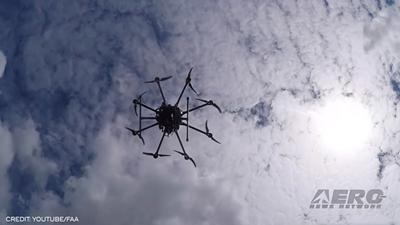Sun, Feb 06, 2022
Guarantees That Air Above Property is Free of Interference, but Subject to Right of Passage
West Virginia's State Senate passed a bill with unanimous approval this week, one which could assist property owners throughout the state in identifying the extent of their airspace holdings.

If Senate Bill 5 passes, airspace over housing will be opened to unmanned aircraft, with a buffer zone closer to ground level reserved for the residents below. The move is hoped to foster advancement and development of the UAS industry throughout the state, allowing operators peace of mind and the ability to fly without undue trouble. Local professors with West Virginia University’s Unmanned Aerial Systems Research told news stations the move will attract business to the state, a sorely needed change after ranking among the most drone-unfriendly states in the union. Whether or not the bill will see its way through to fulfillment remains unknown, but has been described as a win either way as long as the overture is noticed by UAS operators.
The bill would create an Unmanned Systems Advisory Council to identify trends, develop state strategies, develop legislation, and deal with public facing drone issues. The bill sets out procedures for the use and transfer of airspace above government property, as well as delineates the use envelope of airspace terrestrial property owners are entitled to.
Of particular note to operators, the particular text of the bill seeks to harmonize the interests of aircraft and property residents, reading "The ownership of the space above the lands and waters of this state is declared to be vested in the owner of the surface beneath, but this ownership extends only so far as is necessary to the enjoyment and use of the surface without the interference and is subject to the right of passage or flight of aircraft, including unmanned aircraft systems."
Senator Chandler Swope, the sponsor of the bill, hopes to bump West Virginia’s standing in drone rankings and bring a portion of the rapidly growing industry into their own backyard. “West Virginia has the terrain,” Swope said. “We have mountains, valleys, bridges, towers, we’ve got everything including the weather that’s variable with turbulence and all that. So geographically, we think we’re an ideal location for doing research and development.”
More News
“We respectfully call on the City of Mesa to: 1. Withdraw the landing fee proposal immediately 2. Engage with the aviation community before making decisions that impact safet>[...]
High Speed Taxiway A long radius taxiway designed and provided with lighting or marking to define the path of aircraft, traveling at high speed (up to 60 knots), from the runway ce>[...]
Aero Linx: International Federation of Airworthiness (IFA) IFA uniquely combines together all those with responsibility for policies, principles and practices concerned with the co>[...]
Controller’s Expectation That VW02 Would Have Departed Sooner Led To An Inadequate Scan And Loss Of Situational Awareness Analysis: A Robinson R-44 helicopter N744AF, VW02 (V>[...]
A Few Questions AND Answers To Help You Get MORE Out of ANN! 1) I forgot my password. How do I find it? 1) Easy... click here and give us your e-mail address--we'll send it to you >[...]
 Aero-News: Quote of the Day (12.09.25)
Aero-News: Quote of the Day (12.09.25) ANN's Daily Aero-Term (12.09.25): High Speed Taxiway
ANN's Daily Aero-Term (12.09.25): High Speed Taxiway ANN's Daily Aero-Linx (12.09.25)
ANN's Daily Aero-Linx (12.09.25) NTSB Final Report: Diamond Aircraft Ind Inc DA20C1 (A1); Robinson Helicopter R44
NTSB Final Report: Diamond Aircraft Ind Inc DA20C1 (A1); Robinson Helicopter R44 ANN FAQ: Q&A 101
ANN FAQ: Q&A 101



